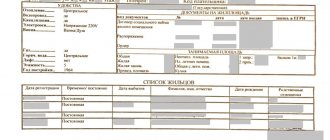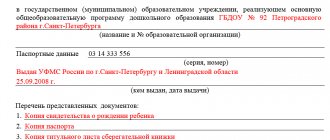Legislative aspects and standard package of documents
The rights of the child are protected by the Housing and Civil Codes of the Russian Federation. The state structure - the guardianship and trusteeship authorities - protects his property rights. A real estate transaction will be considered void if it is not approved by the guardianship authorities. In any situation, the authorities are on the side of the minor.
Important! You cannot discharge a child “to nowhere.” He must be given a new place of residence. Moreover, the conditions in another place must be equal or better than in the previous one.
An application for deregistration of a minor is considered by the court. Relevant documents are attached to it.
- Completed application. Its form can be found on the resources of the Federal Migration Service. The required fields to fill out are: full name, registration address, passport information, new registration address.
- Identity document for the applicant (passport) and the minor (birth certificate for children under 14 years of age and passport if his age exceeds 14 years);
- Documents confirming ownership of real estate.
The list of documents may differ in different regions. Detailed information about it can be found on the official website of the Federal Migration Service.
If the applicant cannot independently apply to the Federal Migration Service, then he has the right to transfer his powers to an authorized person who will defend the interests of the interested party in the presence of a notarized power of attorney.
The processing time for the application is three working days. If the court grants the application, the applicant will receive a departure certificate. It is used to register at a new place of residence. You shouldn’t delay it: the law provides for fines for violating registration deadlines.
Where to contact
To obtain an extract, apply to the MFC at your previous place of residence.
In case of simultaneous registration and deregistration, documents are submitted to institutions only at the new address.
The discharge period may take from 3 to 7 business days , depending on the individual situation. In any case, the specialist notifies you of the exact date of the final discharge.
Completed documents are collected at the same place where you submit them.
Documents can also be submitted through the Internet portal of government services. However, you still need to come to the MFC at the appointed time and submit documents in paper form.
Who is deregistering
Usually, parents decide on the issue of termination of registration simultaneously with themselves and their child . When the baby is not registered with mom/dad. For example, parents moved out earlier due to some circumstances, but their child continued to be listed as living. area. Then the “discharge” issue is dealt with only for the minor.
An outsider can also terminate the registration of a minor. In life, this is a homeowner who wants to get rid of “undesirable tenants.” Contrary to the wishes of the parents, he organizes through the court both the eviction and the discharge of the baby.
How to remove a minor child from an apartment when selling it
The deregistration procedure depends on whether the person is the owner of the apartment or not. There are two possible options here.
The child is the owner of the property being sold
The transaction can only be carried out with the approval of the guardianship authorities. The seller or his representative must obtain permission from a government agency to sell real estate. This must be done before the preliminary purchase and sale agreement is executed.
Important! The child's share in the new housing must be equal. That is, if he was the owner of 12 sq. meters in a three-room apartment, then in new housing its share should not be less than this standard. The total footage of the new facility and the number of residents living in it are not taken into account.
If the sale of real estate is not accompanied by a transaction to purchase a new home, then the share expressed in cash must be transferred to his personal account. If this condition is not met, the transaction may be declared invalid and each party will have to return to the original position: the seller must return the money, and the buyer must return the property.
Algorithm of actions: how to discharge a minor child from an apartment and register him in another (upon sale)
The first step is to contact the passport office to obtain a certificate of all registered persons in the apartment. It can be received by a legal representative - parents or guardians. To do this, it is enough to provide identification documents and proof of the minor’s ownership of housing.
With the received certificate, you must contact the guardianship authorities. In addition to this, the following documents will be required:
- passports of both parents and legal representatives;
- birth certificate (or passport);
- certificate of ownership of the property being sold;
- preliminary purchase and sale agreement for a new property;
- technical passports for the old and new apartment.
Important! Both parents must be present when visiting the guardianship authorities, even if they are divorced. An application requesting permission to sell an apartment in order to purchase a new one is written by each party, including the incapacitated person (if he is over 14 years old).
The application is reviewed within 14 days. Then the guardianship authorities make their decision. It contains specific conditions for the sale of one object for the acquisition of another.
After receiving a positive decision, transactions can be registered at the Registration Chamber. Extract is possible only upon receipt of a certificate of ownership of the new object.
To register, legal representatives must contact the Federal Migration Service at their new place of residence. In addition to the departure certificate, they must provide the following documents:
- a document confirming ownership of the new property;
- representative's passport;
- birth certificate (or passport);
- permission from the guardianship authorities.
If the incapacitated person is not the owner of the property being sold
If the minor is not the owner of the property being sold, then the transaction can be carried out without the permission of the guardianship authorities. In order for it to be recognized as valid, it is necessary to register him at the new place of residence with his parents or with one parent (Article 20 of the Civil Code of the Russian Federation).
Action algorithm
- You must contact the passport office with a package of documents and write an application for deregistration. The presence of an incapacitated person is mandatory if he is 14 years old. One of the parents can accompany him. The list of documents for deregistration includes: technical passport of the new home; applicant's passport; identification document of the minor.
- Write an application for deregistration. It must be in two copies: the first is filled out by the owner of the property, the second - by the minor. For children under 14 years old, it must be filled out by parents.
- The procedure is carried out within seven days. Then the applicant is invited to the Federal Migration Service to receive a disposal certificate; children do not have to visit the passport office a second time.
What other conclusions arise?
In the Tax Code of the Russian Federation, in the chapter devoted to personal income tax, the same composition of relatives appears in one more place: in Art. 220 of the Tax Code states that when buying an apartment from relatives, you cannot take advantage of the property deduction for personal income tax.
It turns out that if you register not as a donation, but as a purchase of an apartment from a great-grandmother or great-grandfather, you can receive both an apartment and the right to a tax deduction.
Let us remind you that the maximum tax deduction for an apartment is 2,000,000 rubles. That is, the existing tax refund mechanism allows you to return up to 260,000 rubles from the budget.
How to remove a minor child from an apartment after a divorce
Divorce of parents is not grounds for termination of the right to use residential premises by their children. Let's look at cases that are common in practice.
Option No. 1 – the father is against the eviction of children from his living space
As statistics show, after a divorce, most children remain to live with their mother. If they are registered with their father and live with their mother, then questions about how to expel a minor child from the apartment without the father’s consent will not arise. The court will approve the application for deregistration. The other party will not be able to challenge it.
Option No. 2 – mother is against evicting children from father’s living space
In this case, the law will be on the side of the father if the children actually live with the mother. He files a lawsuit to evict the minors. When considering it, the court takes into account the conditions at the previous and new place of residence.
Procedure
Algorithm of actions for discharge of a relative, in case he agrees to the procedure :
- On a certain day, you visit the passport office together with a relative, having prepared a package of documents - a house register, passports (we talked about which authorities are involved in the discharge procedure here).
- Fill out forms for extract/registration at a different address.
- Submit your documents for verification.
- Waiting for a date to be set when you can pick up the documents.
Application for registration at the place of residence form and sample.
Application for deregistration at the place of residence, form and sample of completion.
Algorithm for discharging a relative without his consent :
- You contact the court, where they issue a list of documents required to be provided.
- You collect a package of papers.
- You are waiting for the court's decision.
Algorithm for expelling a rowdy relative from a municipal apartment (Article 91 of the Housing Code of the Russian Federation):
- Systematically write statements of complaint to the municipality about the antisocial behavior of a relative, make a copy of the document, and give the original to the addressee.
- Systematically calls representatives of the law to calm the violent one, after which you make a copy of the document confirming the arrival of the police.
- You go to court with the above set of documents.
Extract from grandma's apartment
Each parent has the right to register their child in the occupied living space, even if the owner does not consent. When divorcing or moving to a new place, most owners wonder how to remove a minor child from the apartment of a grandparent or other relative.
Here it is important to understand the circumstances on the basis of which the children were registered and the age of the minors. Since the place of residence of children is the place of residence of their parents or one of them, deregistration of minors is possible only upon their written application.
Important! If parents are deregistered, their children automatically lose the right to use the apartment. His new place of residence is determined by the new place of registration of his parents (or one of them).
If a child is the owner of a share of housing, then he can be discharged only with the permission of the guardianship authorities. It can be received by parents, guardians or authorized representatives (if they have a notarized power of attorney).
The owner of the apartment himself, grandparents or other relatives, can evict a minor only through the court. To do this, they need to collect evidence that he does not live in their living space. The court will take into account the technical characteristics of the new housing. This discharge process can take several months.
Background of the issue
Recently, the Ministry of Finance received a question: a great-grandmother gave an apartment to her great-grandson, so why are the parents of a minor great-grandson forced to pay personal income tax on this gift? After all, gifts from relatives should not be subject to personal income tax.
In a letter from the Ministry of Finance dated September 24, 2019 No. 03-04-05/55239, officials explained to those questioning that the definition of who is a relative differs in different areas of Russian legislation.
Yes, in Art. 1145 of the Civil Code of the Russian Federation, great-grandparents are recognized as relatives of their great-grandchildren. But Art. 217 of the Tax Code of the Russian Federation, paragraph 18.1 of which provides for a personal income tax benefit for gifts from relatives, provides the following list of relatives (with reference to the Family Code):
“spouses, parents and children, including adoptive and adopted parents, grandparents and grandchildren, full and half (having a common father or mother) brothers and sisters.”
Since there are no great-grandmothers in the Tax Code of the Russian Federation, the officials reasoned, following the tax authorities, this means that there are no benefits for personal income tax. Therefore, if a great-grandmother or great-grandfather decides to give a valuable gift to a great-grandson, the great-grandson is not entitled to any benefits. And if the great-grandson is a minor, then the obligation to pay personal income tax on the gift falls on those who are responsible for him: parents or adoptive parents.
Deregistration from municipal housing: subtleties
Key points:
- Discharge from municipal housing is possible if the child is provided with an equivalent place of residence - Article 20 of the Civil Code of the Russian Federation.
- The procedure is carried out with the permission of the guardianship authorities.
- It is impossible to remove a minor from municipal housing to a communal apartment (99% of courts refuse such a claim).
Instructions
First, you need to get a certificate of those living in the apartment from the passport office and a personal account from the accounting department of the passport office.
Next, the consent of the guardianship authorities will be required. Parents, together with the incapacitated person (if he is over 14 years old), need to visit this structure and write a statement. The following documents will be required for its consideration:
- certificate of registration in municipal housing;
- parents' passport;
- birth certificate;
- social rental agreement (or warrant);
- personal account;
- a document confirming the right to use new housing: a rental agreement or a certificate of ownership;
- technical passports of the old and new residence.
- The application is written in hand by each parent indicating the place of new residence. If the child is 14 years old or older, he or she must fill out their own application form. In other cases, parents do this for him.
- The appeal is considered within 14 days. During this period, the guardianship authorities check it for signs of infringement of the interests of the incapacitated party. If they were not detected, then a positive decision is made, that is, written permission is given to deregister.
- You must go to the passport office with this document. In addition, you will need a social tenancy agreement or a certificate of ownership of the new property, parents’ passports, and documents for a minor. Within seven days, the Federal Migration Service authorities verify the accuracy of the data provided and issue a departure sheet.
Evicting a minor is a complex process. Such a decision is carefully weighed by both the guardianship authorities and the court. The law always protects the rights of children; it will not work to write them out for selfish purposes.
What will they give out?
After the child is discharged, you will be given a certificate stating that he/she does not currently have registration and the obligation to register it within the near future . As a rule, the phrase “near future” means a period from ten days to one month (in special cases).
Upon the newly registered registration, a corresponding certificate is issued. If the child has reached the age of 14, a corresponding entry is made in his passport and a stamp is placed on the front page of the registration.










